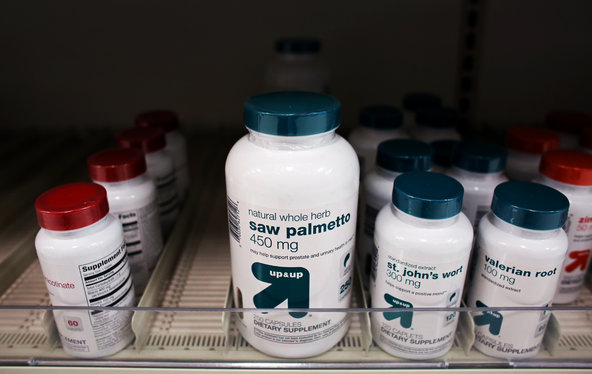
Integrative Medicine of New Jersey is committed to provide the most complete line of science-based nutritional supplements. Available through health professionals, finished products are pure, sophisticated and hypo-allergenic to optimize the long-term health of the most sensitive patients.
The New York State attorney general’s office accused four national retailers on Monday of selling dietary supplements that were fraudulent and in many cases contaminated with unlisted ingredients.
The authorities said they had run tests on popular store brands of herbal supplements at the retailers — Walmart, Walgreens, Target and GNC — which showed that roughly four out of five of the products contained none of the herbs listed on their labels. In many cases, the authorities said, the supplements contained little more than cheap fillers like rice and house plants, or substances that could be hazardous to people with food allergies.
At GNC, for example, the agency found that five out of six samples from the company’s signature “Herbal Plus” brand of supplements “were either unrecognizable or a substance other than what they claimed to be.” In pills labeled ginkgo biloba, the agency found only rice, asparagus and spruce, an ornamental plant commonly used for Christmas decorations.
At Target, the agency tested six herbal products from its popular “Up and Up” store brand of supplements. Three out of six – including ginkgo biloba, St. John’s wort and valerian root, a sleep aid – tested negative for the herbs listed on their labels. But the agency did find that the pills contained powdered rice, beans, peas and wild carrots.
Here are the products that were analyzed by the attorney general, along with the test results that were described in cease-and-desist letters that the agency sent to the four retailers.
From GNC, Herbal Plus brand:
Gingko Biloba:
• No gingko biloba found
• Did detect allium (garlic), rice, spruce and asparagus
St. John’s Wort
• No St. John’s Wort found
• Did detect allium (garlic), rice and dracaena (a tropical houseplant)
Ginseng
• No ginseng found
• Did detect rice, dracaena, pine, wheat/grass and citrus
Garlic
• Contained garlic
Echinacea
• No echinacea found
• Did detect rice in some samples
Saw Palmetto
• One sample contained the clear presence of palmetto
• Other samples contained a variety of ingredients, including asparagus, rice and primrose
From Target, Up & Up brand
Gingko Biloba
• No gingko biloba found
• Found garlic, rice and mung/French bean
St. John’s Wort
• No St. John’s Wort found
• Found garlic, rice and dracaena (houseplant)
Garlic
• Contained garlic
• One test identified no DNA
Echinacea
• Most but not all tests detected Echinacea
• One test identified rice
Saw Palmetto
• Most tests detected saw palmetto
• Some tests found no plant DNA
Valerian Root
• No valerian root found
• Found allium, bean, asparagus, pea family, rice, wild carrot and saw palmetto
From Walgreens, Finest Nutrition brand
Gingko Biloba
• No gingko biloba found
• Did detect rice
St. John’s Wort
• No St. John’s Wort found
• Detected garlic, rice and dracaena
Ginseng
• No ginseng found
• Detected garlic and rice
Garlic
• No garlic found
• Detected palm, dracaena, wheat and rice
Echinacea
• No echinacea found
• Identified garlic, rice and daisy
Saw Palmetto
• Contained saw palmetto
From Walmart, Spring Valley brand
Gingko Biloba
• No gingko biloba found
• Found rice, dracaena, mustard, wheat and radish
St. John’s Wort
• No St. John’s Wort found
• Detected garlic, rice and cassava
Ginseng
• No ginseng found
• Found rice, dracaena, pine, wheat/grass and citrus
Garlic
• One sample showed small amounts of garlic
• Found rice, pine, palm, dracaena and wheat
Echinacea
• No echinacea or plant material found
Saw Palmetto
• Some samples contained small amounts of saw palmetto
• Also found garlic and rice
*On February 6, 2015, Biotics Research Corporation released this statement against the lawsuits brought against GNC, Target, Walgreens and Walmart)…
Biotics Research Corporation, an industry leader in the development and manufacturing of superior nutritional supplements available through healthcare professionals, launched a new Patient/Consumer Awareness Campaign in response to the law enforcement actions recently taken by the New York Attorney General against Target, GNC, Walmart, and Walgreens.
“For nearly four decades we’ve worked closely with healthcare practitioners around the globe to educate patients and reinforce just how critical it is for consumers to purchase their supplementation through licensed healthcare providers,” said Denis DeLuca, President of Biotics Research. “And this latest action by the New York Attorney General’s office is just yet another example that underscores this.”
The New York State Attorney General’s office accused four major retailers on Monday of selling fraudulent and potentially dangerous herbal supplements and demanded that they remove the products from their shelves.
The authorities said they had conducted tests on top-selling store brands of herbal supplements at four national retailers (GNC, Target, Walgreens and Walmart) and found that, on average, four out of five products did not contain any of the herbs on their labels. The tests showed that pills labeled medicinal herbs often contained little more than cheap fillers like powdered rice, asparagus and houseplants, and in some cases substances that could be dangerous to those with allergies.
In response to these recent events, and its continuing efforts to help educate the public, Biotics Research is preparing patient education material for thousands of doctors around the world to hand out to their patients, as well as counter displays for each practice and clinic.
“We fully understand the dilemma that patients find themselves in,” added Mr. DeLuca. “It’s easy for a consumer/patient to assume that major retailers would carry legitimate supplements – but clearly not all supplements are created equal – and some are even fraudulent. It’s critical that consumers understand the importance of letting their healthcare professional evaluate supplement manufacturers to ensure the products are both safe and effective.”













